[To the Editor of the SPECTATOR.] Sns,—I hope you will
allow me kindly a little space in which to reply to the two letters you publish from Mr. E. Bevan and Sir Patrick Fagan, remarking on my recent letter in your issue of December 28th.
I see with some satisfaction and relief that both these authorities, writing from entirely different points of view, are agreed as to the correctness of my statement of the essential truths of the existing Indian situation, nor do you question it, when calling it a " 100 per cent. Anglo-Saxon view." These facts were, very briefly :- 1. That no true democracy is possible in India, as the idea is opposed to the whole social complex.
2. That no " self-government " of any kind is possible, owing to the deadly communal feuds and hatreds which permeate the country, and render absolutely necessary the impartial British strong arm that alone keeps the peace.
8. That the real danger arises from the unrest caused amongst the dumb masses (and in all other Indians who have anything to lose) by their fears and suspicions of the loss of British rule, with its impartial justice and security. They begin to think that the British Raj is weakening and may be withdrawn, as promised by the Swarajists. In which case the rival communities would each strive to get in its blow first, and a sanguinary chaos would ensue.
There are other insuperable difficulties besides these, such as the loyal Indian Princes, and the chimera of a purely Indian army, which could in fact neither keep the peace internally nor keep out the foreign invader.
Therefore, if the position, as described above, is accepted as true, it follows that my argument as to the folly and danger of appearing to give in to the demands of the Swarajists, who clamour for " Independence and severance of the British connexion " is proved to the hilt.
Mr. Bevan complains that my views represent " Realism, which leads us nowhere," to which I say that in existing circumstances it leads to peace and security, instead of to the bloody chaos a nebulous " idealism " would condemn us to. Existing circumstances are all I was talking about when I wrote, but surely, even if we are to have the " new outlook " he advocates, it must start' from the foundations of reality ?
To Mr. Bevan's question of " Where is the -bridge between Mr. Bagley's India and the India every patriotic Indian would like to see," the answer is simple—Time and education, till fanaticism disappears, and feelings- of fraternity and equality-are born.
Sir Patrick Fagan practically agrees with me, and it is encouraging to have the support of such a distinguished authority.
As to your description of my views as " 100 per cent. Anglo-Saxon," I venture to explain 'that they may be more correctly called " 100 per cent.' Indian." I was born and educated in India and was dimly aware of religious and caste differences and of their intensity from the age of seven. In a long busy life since, of seventy years' intimate lmowledge and friendship with Indians of all creeds, races and classes, from the coolie to the Rajah, including the Sweeper and the sepoy, and the Swarajist politicians, I hive been up against the same ineradicable fanaticisnis; and it is this intimate certain knowledge that impels me to speak out in the urgent interests of my friends the rear Indians, who are thre_ateried with misery and disaster if the 'rebel politicians get their way and destroy or weaken British Rule.
And here we come to the -fallacy of the argument that " it is not with the inarticulate masses we -have to deal:" It is the first necessity, for peace, that we do deal with'them effect- ually, in easing the burden of their fears of the decline of the British Raj. -
A very simple declaration that " the BritiSh connexion is not going to be severed " is all that is needed."
The • loud calls for " Independence " of the Swarajists. demand an unequivocal refusal, and very prompt action to put down decisively the new propaganda for open rebellion set up by Mr. Subash Chandra Bose and his adherents.
They have had rope enough now to hang themselves. An open declaration of war cannot be ignored. We must " govern







































 Previous page
Previous page